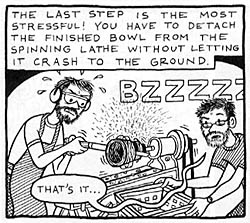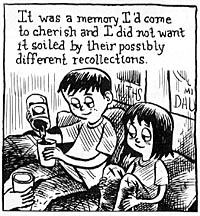 By Ken Dahl, Alec Longstreth, Laura Park, Julia Wertz
By Ken Dahl, Alec Longstreth, Laura Park, Julia Wertz
40 pages, black and white
Published by Tugboat Press
Concluding the look at Greg Means’s anthology comic Papercutter is, interestingly enough, an issue not edited by Means. Unlike Papercutter #4 or #5, Papercutter #6 was guest-edited by Alec Longstreth. For a book that defined its identity in part by stories and creators that Means liked and wanted to commission, having someone else in charge of an issue of Papercutter made me wonder if the overall tone of the comic would change. And while I think this issue was a little different, that wasn’t necessarily a bad thing.
 The bulk of the issue is taken up by Alec Longstreth’s “Summer Stock,” clocking in at 24 pages. Detailing the time that Alec worked at a summer theatre company building sets, I was almost instantly struck by how well Longstreth manages to balance the narrative between a description of what it’s like to constantly build and then strike sets, and his own personal experience in being away for the summer working on this project. Watching Alec’s glee as he and Dan create sets that are easily changeable and increasingly elaborate matches nicely with Longstreth’s work in comics these days, forever challenging and attempting to best himself. Longstreth’s diagrams of set construction are fascinating to look at, a real testament to both Longstreth’s storytelling abilities as well as the actual creations themselves. The real emotional core of the story for me, though, is when Alec uses a lathe to create a wooden bowl. His reaction to both the initial creation (and then damaging) of the bowl, and later when he presents it to his parents, says so much about his strive for perfectionism, the amount of pride in his work, and also the emotional state he’s in upon leaving the theatre company. It’s a powerful ending to “Summer Stock” and I’m glad Longstreth got the extra pages (pushing Papercutter up to 40 pages for this issue) to fully explore the story.
The bulk of the issue is taken up by Alec Longstreth’s “Summer Stock,” clocking in at 24 pages. Detailing the time that Alec worked at a summer theatre company building sets, I was almost instantly struck by how well Longstreth manages to balance the narrative between a description of what it’s like to constantly build and then strike sets, and his own personal experience in being away for the summer working on this project. Watching Alec’s glee as he and Dan create sets that are easily changeable and increasingly elaborate matches nicely with Longstreth’s work in comics these days, forever challenging and attempting to best himself. Longstreth’s diagrams of set construction are fascinating to look at, a real testament to both Longstreth’s storytelling abilities as well as the actual creations themselves. The real emotional core of the story for me, though, is when Alec uses a lathe to create a wooden bowl. His reaction to both the initial creation (and then damaging) of the bowl, and later when he presents it to his parents, says so much about his strive for perfectionism, the amount of pride in his work, and also the emotional state he’s in upon leaving the theatre company. It’s a powerful ending to “Summer Stock” and I’m glad Longstreth got the extra pages (pushing Papercutter up to 40 pages for this issue) to fully explore the story.
 Ken Dahl’s “Gordon Smalls Endures the Wasteland” holds the dubious honor of being the only story in three issues of Papercutter about which I find it hard to form a concrete opinion. It’s certainly well-crafted, the story of a man driving across the country who has grown disaffected with American society in general. The story is almost entirely Gordon Smalls’s rant as he observes in disgust everything around him. Dahl does a great job of portraying Smalls, both in terms of his diatribes about our mark on the world, as well as how Dahl draws Smalls’s pinched and loathing face. It’s an uncomfortable story to read, both because of Smalls’s outsider attitude that makes him feel like a ticking time bomb, as well as because the core of Smalls’s rant is hard to deny as being true. The end result is a story that actually made me squirm in my chair a bit. Somehow, I suspect that’s exactly what Dahl was going for.
Ken Dahl’s “Gordon Smalls Endures the Wasteland” holds the dubious honor of being the only story in three issues of Papercutter about which I find it hard to form a concrete opinion. It’s certainly well-crafted, the story of a man driving across the country who has grown disaffected with American society in general. The story is almost entirely Gordon Smalls’s rant as he observes in disgust everything around him. Dahl does a great job of portraying Smalls, both in terms of his diatribes about our mark on the world, as well as how Dahl draws Smalls’s pinched and loathing face. It’s an uncomfortable story to read, both because of Smalls’s outsider attitude that makes him feel like a ticking time bomb, as well as because the core of Smalls’s rant is hard to deny as being true. The end result is a story that actually made me squirm in my chair a bit. Somehow, I suspect that’s exactly what Dahl was going for.
 “Public Hair” by Julia Wertz and Laura Park closes out Papercutter #6. It’s a short-but-sweet story, ostensibly about three friends finding an issue of Playboy as children, but really about friendships and growing up. It’s quick to the point, but doesn’t feel rushed in the slightest; the story hits just the right emotional level that addresses those lost friends from childhood that almost everyone has. The fact that it’s centered around the discovery of pictures of naked women adds a slight punch of humor to “Public Hair” but really, it’s a serious and thoughtful story. I was equally impressed with the art, with its dark cross-hatching and full backgrounds. It’s a gem of a story, and it’s entries like these that really couldn’t end up elsewhere on their own due to length that makes me all the more pleased that anthologies like Papercutter exist.
“Public Hair” by Julia Wertz and Laura Park closes out Papercutter #6. It’s a short-but-sweet story, ostensibly about three friends finding an issue of Playboy as children, but really about friendships and growing up. It’s quick to the point, but doesn’t feel rushed in the slightest; the story hits just the right emotional level that addresses those lost friends from childhood that almost everyone has. The fact that it’s centered around the discovery of pictures of naked women adds a slight punch of humor to “Public Hair” but really, it’s a serious and thoughtful story. I was equally impressed with the art, with its dark cross-hatching and full backgrounds. It’s a gem of a story, and it’s entries like these that really couldn’t end up elsewhere on their own due to length that makes me all the more pleased that anthologies like Papercutter exist.
After reading Papercutter #4-6, my immediate reaction was to think that I need to track down copies of #1-3. It’s a fine series, one never disappointed me and kept my interest levels up. Longstreth’s guest-editing stint seemed a little more mixed-bag than the other issues, although at the same time it’s hard to describe why. It’s still an excellent issue, though, and Means did well to entrust his series to someone else for an issue. If you haven’t been reading Papercutter, I whole-heartedly recommend you check out the Tugboat Press website. Trust me, it’s hard to go wrong with this book.
